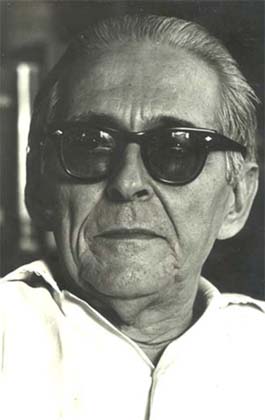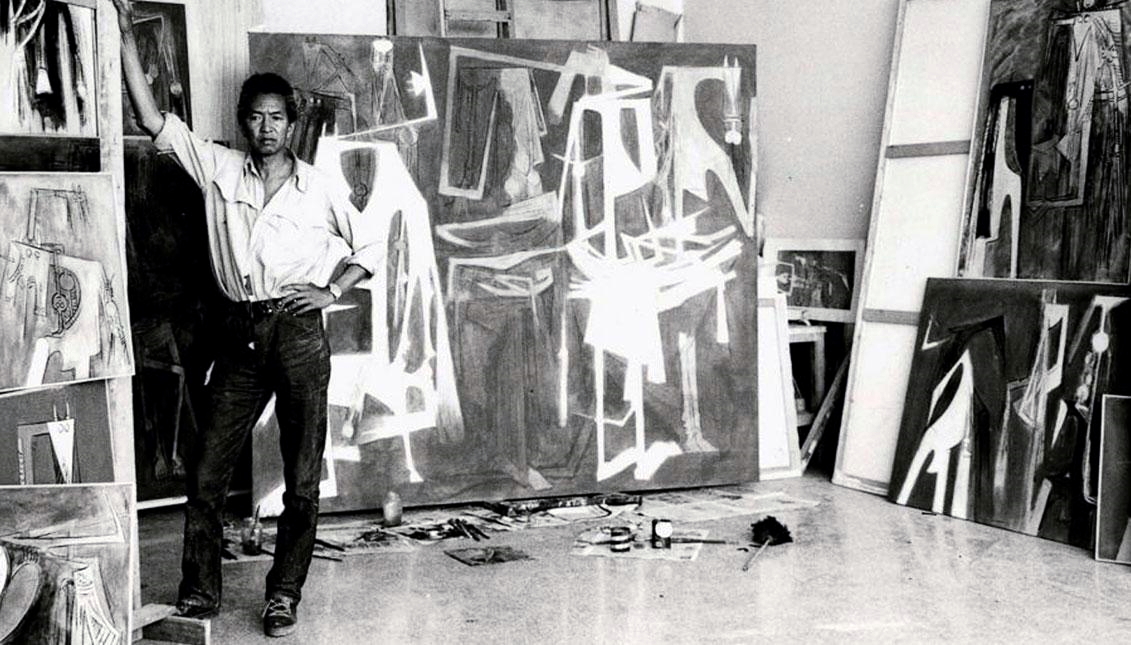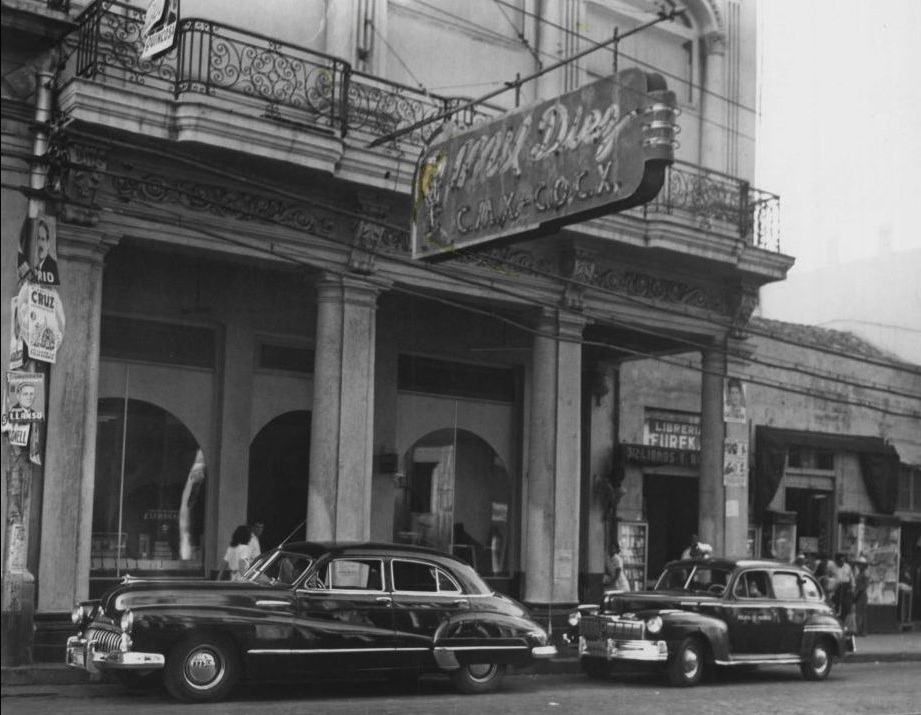|
Blas Roca Calderio
Blas Roca Calderio (24 July 1908 – 25 April 1987) was a Cuban politician and Marxist theorist who served as President of the National Assembly of People's Power in Cuba from 1976 to 1981. He was also head of the pre-1959 revolution Communist Party of Cuba for 28 years and editor of the communist newspaper ''Hoy''. He was a signatory of the Cuban Constitution of 1940 and chaired the committee that wrote the country's first socialist constitution in 1976. Biography Blas Roca, born Francisco Wilfredo Calderío López in Manzanillo, Cuba left school at the age of 11 and began shining shoes to help support his poor family. He changed his name to Roca, meaning 'rock', after he joined the Communist Party in 1929. In 1929, he was elected Secretary General of the Union of Shoemakers of Manzanillo. In August 1931 he was elected to the Central Committee of the Communist Party and appointed head of his organization in the East. During this stage he displayed significant journalistic activ ... [...More Info...] [...Related Items...] OR: [Wikipedia] [Google] [Baidu] |
National Assembly Of People's Power
The National Assembly of People's Power ( es, Asamblea Nacional del Poder Popular) is the unicameral parliament of the Republic of Cuba. It is currently composed of 605 representatives who are elected from multi-member electoral districts for a term of five years. The current President of the Assembly is Esteban Lazo Hernández. The Assembly only meets twice a year, with the 31-member Council of State exercising legislative power throughout the rest of the year. The most recent elections were held on 11 March 2018. After the 2023 elections, the number of representatives will decrease to 474. Voters can select individual candidates on their ballot, select every candidate, or leave every question blank, with no option to vote against candidates. During the 2013 elections, around 80% of voters selected every candidate for the Assembly on their ballot, while 4.6% submit a blank ballot; no candidate for the Assembly has ever lost an election in Cuban history. Overview The Assembly ... [...More Info...] [...Related Items...] OR: [Wikipedia] [Google] [Baidu] |
Georgi Dimitrov
Georgi Dimitrov Mihaylov (; bg, Гео̀рги Димитро̀в Миха̀йлов), also known as Georgiy Mihaylovich Dimitrov (russian: Гео́ргий Миха́йлович Дими́тров; 18 June 1882 – 2 July 1949), was a Bulgarian communist politician. He was the first communist leader of Bulgaria from 1946 to 1949. Dimitrov led the Communist International from 1935 to 1943. Early life Dimitrov was born in Kovachevtsi in present-day Pernik Province, the first of eight children, to refugee parents from Ottoman Macedonia (a mother from Bansko and a father from Razlog). His father was a rural craftsman, forced by industrialisation to become a factory worker. His mother, Parashkeva Doseva, was a Protestant Christian, and his family is sometimes described as Protestant. The family moved to Radomir and then to Sofia. One of Georgi's brothers, Nikola, moved to Russia, joined the Bolsheviks in Odessa until he was arrested in 1908 and exiled to Siberia, where he died in ... [...More Info...] [...Related Items...] OR: [Wikipedia] [Google] [Baidu] |
Félix Pita Rodríguez
Félix Pita Rodriguez (1909-1990) was a Cuban journalist, poet and literary critic. He was born in Bejucal. An active communist, Rodriguez helped to found the Ibero-American Anti-Fascist Committee during the Spanish Civil War. His literary acquaintances included Pablo Neruda. He was exiled from Cuba for many years, living in Latin America and Europe. After Castro's overthrow of the Batista government, he returned to Cuba in 1960. He won Cuba's National Literary Prize National Prize for Literature (''Premio Nacional de Literatura de Cuba'') is the national literature prize of Cuba. It has been given annually since 1983 and recognizes those writers who have enriched the legacy of Cuban literature. It has been ca ... in 1985. Works * ''San Abul de Montecallado'', 1945 * ''Corcel de Fuego'', 1948 * ''Tobías'', 1955 * ''Las Noches'', 1964 * ''Historia tan Natural'', 1971 * ''Niños de Vietnam'', 1974 * ''Poesía y Prosa'', 1976 * ''La Pipa de Cerezo'', 1987 * ''Asesor Liter ... [...More Info...] [...Related Items...] OR: [Wikipedia] [Google] [Baidu] |
Nicolás Guillén
Nicolás Cristóbal Guillén Batista (10 July 1902 – 17 July 1989) was a Cuban poet, journalist, political activist, and writer. He is best remembered as the national poet of Cuba.Associated Press, "Nicolas Guillen, 87, National Poet of Cuba" ''The New York Times'', 18 July 1990: A19. Born in , he studied law at the , but abandoned a legal career and worked as both a typographer and journalist. His poetry was published in various magazines from the early 1920s; his fir ... [...More Info...] [...Related Items...] OR: [Wikipedia] [Google] [Baidu] |
Wifredo Lam
Wifredo Óscar de la Concepción Lam y Castilla (; December 8, 1902 – September 11, 1982), better known as Wifredo Lam, was a Cuban artist who sought to portray and revive the enduring Afro-Cuban spirit and culture. Inspired by and in contact with some of the most renowned artists of the 20th century, including Pablo Picasso, Henri Matisse, Frida Kahlo and Diego Rivera, Lam melded his influences and created a unique style, which was ultimately characterized by the prominence of hybrid figures. This distinctive visual style of his also influences many artists. Though he was predominantly a painter, he also worked with sculpture, ceramics and printmaking in his later life. Early life Wifredo Lam was born and raised in Sagua La Grande, a village in the sugar farming province of Villa Clara, Cuba. He was of mixed-race ancestry: his mother, the former Ana Serafina Castilla, was born to a Congolese former slave mother and a Cuban mulatto father and his father, Yam Lam, was a C ... [...More Info...] [...Related Items...] OR: [Wikipedia] [Google] [Baidu] |
Alejo Carpentier
Alejo Carpentier y Valmont (, ; December 26, 1904 – April 24, 1980) was a Cuban novelist, essayist, and musicologist who greatly influenced Latin American literature during its famous "boom" period. Born in Lausanne, Switzerland, of French and Russian parentage, Carpentier grew up in Havana, Cuba, and despite his European birthplace, he strongly identified as Cuban throughout his life. He traveled extensively, particularly in France, and to South America and Mexico, where he met prominent members of the Latin American cultural and artistic community. Carpentier took a keen interest in Latin American politics and often aligned himself with revolutionary movements, such as Fidel Castro's Communist Revolution in Cuba in the mid-20th century. Carpentier was jailed and exiled for his leftist political philosophies. With a developed knowledge of music, Carpentier explored musicology, publishing an in-depth study of the music of Cuba, ''La música en Cuba'' and integrated musical th ... [...More Info...] [...Related Items...] OR: [Wikipedia] [Google] [Baidu] |
Radio Mil Diez
Radio Mil Diez (or Radio 1010) was a radio station broadcasting from Havana, Cuba, owned by the Popular Socialist Party (PSP). Radio Mil Diez broadcast for five years, between 1943-1948, and played an important role in shaping contemporary Cuban music. Emergence Following the entry of the Soviet Union in the war against Germany the Cuban communists re-emerged as a legal political party, the PSP. The party purchased Radio Lavín and converted it into Radio Mil Diez in 1943. The first broadcast was made on April 1, 1943. The name reflected the dial sign (1010). Radio Mil Diez became an important propaganda weapon of the party, and one of the foremost communist media outlets in the Caribbean at the time. The slogans of the radio station were ''La emisora del pueblo'' ('The Broadcaster of the People') and ''Todo lo bueno al servicio del pueblo'' ('All the Best to Serve the People'). Frequency Radio Mil Diez had the most powerful shortwave radio transmitter in Havana. It broadcast on ... [...More Info...] [...Related Items...] OR: [Wikipedia] [Google] [Baidu] |
Juan Marinello
Juan Marinello Vidaurreta (2 November 1898 – 27 March 1977) was a Cuban Communist intellectual, writer, poet essayist, lawyer and politician. He was one of the most prominent Cuban intellectual figures of the interwar period and post revolutionary Cuba. Biography Marinello was born to a Spanish father and Cuban mother. He went to Spain as a child and studied in Villafranca del Panadés (Catalonia), his father's homeland, until he was sixteen, when the family returned to Cuba. He first studied in the city of Santa Clara. Later, he completed his higher studies at the University of Havana. He graduated with a Doctorate in Civil Law, a Doctorate in Public Law, and in Philosophy and Letters. Later, he returned to Spain with a scholarship to get a doctorate at the Central University of Madrid, in Spain. A close friend of the prominent Cuban intellectual Dr. Jorge Mañach during their youth, in later years they irremediably distanced themselves due to political issues. This happene ... [...More Info...] [...Related Items...] OR: [Wikipedia] [Google] [Baidu] |
Carlos Rafael Rodriguez
Carlos may refer to: Places ;Canada * Carlos, Alberta, a locality ;United States * Carlos, Indiana, an unincorporated community * Carlos, Maryland, a place in Allegany County * Carlos, Minnesota, a small city * Carlos, West Virginia ;Elsewhere * Carlos (crater), Montes Apenninus, LQ12, Moon; a lunar crater near Mons Hadley People * Carlos (given name), including a list of name holders * Carlos (surname), including a list of name holders Sportspeople * Carlos (Timorese footballer) (born 1986) * Carlos (footballer, born 1995), Brazilian footballer * Carlos (footballer, born 1985), Brazilian footballer Others * Carlos (Calusa) (died 1567), king or paramount chief of the Calusa people of Southwest Florida * Carlos (DJ) (born 1966), British DJ * Carlos (singer) (1943—2008), French entertainer * Carlos the Jackal, a Venezuelan terrorist *Carlos (DJ) (born 2010) Guyanese DJ Arts and entertainment * ''Carlos'' (miniseries), 2010 biopic about the terrorist Carlos the Jackal ... [...More Info...] [...Related Items...] OR: [Wikipedia] [Google] [Baidu] |
International Brigades
The International Brigades ( es, Brigadas Internacionales) were military units set up by the Communist International to assist the Popular Front government of the Second Spanish Republic during the Spanish Civil War. The organization existed for two years, from 1936 until 1938. It is estimated that during the entire war, between 40,000 and 59,000 members served in the International Brigades, including some 10,000 who died in combat. Beyond the Spanish Civil War, "International Brigades" is also sometimes used interchangeably with the term foreign legion in reference to military units comprising foreigners who volunteer to fight in the military of another state, often in times of war. The headquarters of the brigade was located at the Gran Hotel, Albacete, Castilla-La Mancha. They participated in the battles of Madrid, Jarama, Guadalajara, Brunete, Belchite, Teruel, Aragon and the Ebro. Most of these ended in defeat. For the last year of its existence, the International Brig ... [...More Info...] [...Related Items...] OR: [Wikipedia] [Google] [Baidu] |
Second Spanish Republic
The Spanish Republic (), commonly known as the Second Spanish Republic (), was the form of government in Spain from 1931 to 1939. The Republic was proclaimed on 14 April 1931, after the deposition of Alfonso XIII, King Alfonso XIII, and was dissolved on 1 April 1939 after surrendering in the Spanish Civil War to the Nationalist faction (Spanish Civil War), Nationalists led by General Francisco Franco. After the proclamation of the Republic, Provisional Government of the Second Spanish Republic, a provisional government was established until December 1931, at which time the Spanish Constitution of 1931, 1931 Constitution was approved. During this time and the subsequent two years of constitutional government, known as the First Biennium, Reformist Biennium, Manuel Azaña's executive initiated numerous reforms to what in their view would modernize the country. In 1932 the Jesuits, who were in charge of the best schools throughout the country, were banned and had all their propert ... [...More Info...] [...Related Items...] OR: [Wikipedia] [Google] [Baidu] |
Bohemia
Bohemia ( ; cs, Čechy ; ; hsb, Čěska; szl, Czechy) is the westernmost and largest historical region of the Czech Republic. Bohemia can also refer to a wider area consisting of the historical Lands of the Bohemian Crown ruled by the Bohemian kings, including Moravia and Czech Silesia, in which case the smaller region is referred to as Bohemia proper as a means of distinction. Bohemia was a duchy of Great Moravia, later an independent principality, a kingdom in the Holy Roman Empire, and subsequently a part of the Habsburg monarchy and the Austrian Empire. After World War I and the establishment of an independent Czechoslovak state, the whole of Bohemia became a part of Czechoslovakia, defying claims of the German-speaking inhabitants that regions with German-speaking majority should be included in the Republic of German-Austria. Between 1938 and 1945, these border regions were joined to Nazi Germany as the Sudetenland. The remainder of Czech territory became the Second ... [...More Info...] [...Related Items...] OR: [Wikipedia] [Google] [Baidu] |



